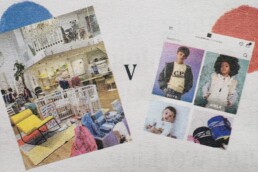It takes a while for Sebastian to meet me at the press room weaving as he does through the aisles & corridors of the brands exhibiting at Playtime, Paris. As exhibitors and visitors stop to chat it’s a challenge for the co-founder of Playtime to move quickly around the show. The purpose of our meeting is a brief chat about Playtime’s new Shanghai show. Everyone is talking about the pros and cons of venturing into an untapped Chinese market.
Of course, we see Chinese buyers at the shows as they have historically travelled across to see what European brands have to offer. However, the brands have in large part not reciprocated. So what are the benefits of venturing into the Chinese market? Currently, the European market seems to have a finite number of buyers which is making it difficult for labels looking to expand their customer base. On one hand testing new markets is essential for business growth. However, it’s been well documented that even the luxury giants in men’s and womenswear have struggled with copyright infringement and the mounting legal fees as a consequence. Should this put off European labels or does fortune favour the bold, I talk with Sebastien to find out more…

So why Shanghai? Well, obviously brands are looking for new markets to expand in general and the internet is not providing enough expansion (opportunities). To be honest, the Chinese market is something that everybody’s been talking about for 20 years now, and we’ve been thinking about it for a long time. It’s a huge market, one of the few markets in the world that is developing with a two figure increase every year, even though it is a bit lower lately. It’s something we don’t have in Europe.
How many brands are you taking to Shanghai and what will the structure of the show be? For Shanghai it’s been the human encounter like it always is with our shows. We met somebody there who we’re going to partner with. They are going to help us with marketing, communication and visitors. They already have a database of buyers, agents and distributors. We have our WeChat online for the company. We want to have a very focused show to start with because the Chinese market, however big it is, it’s small for designer brands. That said it could expand very quickly.
We’ve spoken with a lot of people who started in China ten years ago and everybody said that it was the market where we needed to be and then it didn’t really happen. It’s a complicated and difficult market to get into. You have to be prepared, so we will take up to 45 brands because we feel that’s what the market can take but if we discover the market can take more, we will take more.
Obviously, with the Chinese market there are well-documented issues with copyright infringement & counterfeit, what are you going to do to help protect the brands? The only thing we can do is what we do with the brands at the show here (in Paris). Beyond that it’s completely out of our control. We aim to work with labels for the first season that are already in the Chinese market, brands that have deposited their brand name. But even if you have your brand name deposited the problem for copies is still there and you need to have somebody there on your side to fight for your brand.
What we can do as a trade show is screen our buyers visiting the show, in other Chinese shows they generally have tens of thousands of visitors but we don’t want that, we want several hundred that will actually be buyers, distributors, press and real professionals, not there to copy.
Will you provide advice for brands regarding the prerequisites to manufacturing, guidelines and restrictions? Really it very much depends on the product of course. Each product is different and the laws in China change a lot. Imports are developing in China so there are more possibilities for brands to import to China. However, importing I wouldn’t say is complex but it’s a matter that you need to take in hand and it’s best to have someone in China. You need to have a company that has a licence to import things so you will need to find somebody to help. Working with distributors is probably the best thing to do but you no longer need to have one single distributor these days you can have several it’s such a large country.
What factors make a brand ready for the Chinese market? Brand registration is step one, setting up a WeChat is the second, having someone who speaks Chinese is another – that really helps. There are of course some bigger buyers that have international selection most of them speak English, we get those buyers at Playtime Paris. But if you really want to expand in China, it’s the same thing as in any country like the show in Tokyo, it helps to have someone who knows the language and market, likewise in China.
Is Playtime Shanghai for established brands then? I don’t like the word established there are lots of new brands that are incredibly organised. I think it’s more than being established. It’s about organisation and planning. You need to have your branding registered, and import sorted. Out of the 45 brands many of the labels already have their network and need no help from us but some may need advice and we have people to help.
I’m interested to find out what brands will be exhibiting, it’s definitely 45 you’re taking? Yes 45 is the capacity because we know this is the number of happy brands we can have. We could have a show with 120 but I don’t want to have 60 brands that are unhappy with the show. It could grow very fast the Chinese show but it’s only going to grow if we feel the market can take more brands. So really we want to grow organically and really bring people that are ready for it. I think in the first 3 seasons of Playtime New York we accepted too many brands without checking if they were entirely ready for that market.
I think the answer to your question is that everybody needs to expand but not everybody is ready to expand in different markets. If you want to go to the Chinese market you’ve got to give a lot of time to the market.

Speaking with brands it’s evident that there is a real interest in this show. Some already have resellers or distributors in the Chinese market, but it’s the new possibilities from going over there in situ that intrigues. This potential market with its vast population has many brands considering whether this should be part of their expansion strategy. It’s an interesting one to watch, simply put brands need more buyers for growth. But this is uncharted territory and will require commitment and belief from both sides to make it work. It’s always fun to be the first, with risks, challenges and opportunities that will take you by surprise. Pirouette will certainly be watching.
Click here for more information on the Playtime Shanghai show.
Playtime Shanghai, 23-24 July 2019
Katie Kendrick
Katie is a specialist in kids’ fashion and lifestyle, editor, consultant, content creator, and owner of Pirouette - a leading resource to the industry.
With a keen interest in both the business and creative aspects of the industry Katie has interviewed buyers, agents, stylists, designers, influencers, covered runway shows, produced trade show reports and curates thought provoking and engaging exhibitions.
She is passionate about good design, creativity and brands that manage to combine this with their environmental responsibility.
Subscribe to Pirouette's monthly Newsletter.
You might also like
June 23, 2025
Pirouette Picks Playtime Paris & New York
Young brands to look out for...Check out these labels in our Pirouette Picks print zine* selection.
May 20, 2025
Piazza Pirouette
a flurry of newness to Pitti Bimbo 101
Buyers Take Note: Pirouette’s Piazza at Pitti Bimbo 101 Ciao! Pirouette is bringing back exciting brands & a flurry of newness to its Piazza at PittiBimbo 101. The Piazza Pirouette…
April 3, 2025
The state of US
As Trump's tariffs come to pass the real impact will soon become apparent.Interview with US Agent Faigy Drew from Phisticate Originally published in February 2025 in the Pirouette zine AW25 show…
March 12, 2025
Going for Gold(ie) + Ace(ing) it!
Brand spotlight on Goldie + AceInterview with founder Alana Tiller Goldie + Ace are what I like to call a ‘ready to go’ brand – that’s to say they have everything ready: Range, references,…
March 10, 2025
Playtime announce new ‘The Tiny Show On Tour’, Los Angeles
The Tiny Show On Tour, Los Angeles 3-5 August 2025 Playtime have announced a new smaller travelling show. The Tiny Show to take place once a year in different locations, this first time it hits LA.…
March 7, 2025
Brick & Mortar v Online – Who’s winning in the kids’ fashion & lifestyle industry?
Whilst many retailers are struggling with online sales, brick & mortar appears to be on the up.‘Online’ is proving increasingly difficult for many independent retailers to generate growth in…
February 2, 2025
The reign of Rachel Riley
Rachel Riley - dressing royals for over 25 years.Interview with founder Rachel Riley Rachel Riley is a female-led business. Female run, with mostly female customers, amongst them a few Royals. We…
January 20, 2025
What’s hot!? at Pitti Bimbo 100-001
During the two days of Pitti Bimbo 100-001 make sure to check out Pirouette's "What's Hot!?" video installation at the show. From giftables, to shoes, to clothing there's lots to check out &…
January 15, 2025
Find the Pirouette directory zine* in Playtime Paris & New York visitor bags
Find your copy of the Pirouette directory zine* in the Playtime Paris visitor bags this weekend. Packed with business info the directory zine shares the thoughts of anonymous buyers and brands, looks…











